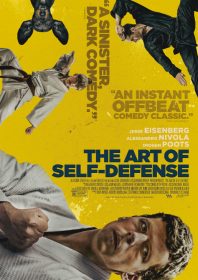
Riley Stearns’ darkly comic study on toxic masculinity is the sort of strikingly original and unsettling vision that lives long in the memory, destined to become a cult favourite. Like a well-timed leg sweep, the film constantly shocks and surprises. When Casey – an ostracised, terminally single accountant played by Jesse Eisenberg, firmly in his comfort zone – is mugged and beaten on his way to buy dog food for his baby dachshund, he decides to take up karate lessons. Alessandro Nivola plays his sensei in what starts as a somewhat obvious lampooning of the type of ‘McDojo’ enterprises you find in small-town America, conjuring up visions of both Rex Kwan Do from Napoleon Dynamite and the misguided machismo of the Karate Kid‘s Cobra Kai school. Sensei is a seemingly ridiculous figure whose philosophy of “become what you fear” starts to have a hypnotic effect on his dojo full of bullied misfits and social outcasts, until his motives are revealed to be much more sinister. He becomes a manipulative force in Casey’s life, and it is at this point that the film stops being about karate and shifts gears into something more existential. Imogen Poots plays the only female in the film, Anna, and forms the crucial apex of a triple header. Anna is shown to be a more rounded fighter than sensei – hilariously teaching off-syllabus Brazilian jiu jitsu chokeholds to infants in the children’s class – but she is denied her rightful place among the black belts because she is seen as a threat to the patriarchy. However, Anna is admired by Casey because of her skill, force and humanity – at least what is left of it – and she represents a somewhat twisted antidote to sensei’s worst behaviours. The film is as much about her journey as Casey’s, and the corrupting forces which influence both of their decisions. Crucially, the film does all of this while remaining deftly comic throughout, with Stearns’ brittle, deadpan dialogue punctuating the air like karate chops. For a martial arts film, it is distinctly low on action, but as a combination of offbeat indie comedy, dark thriller, and a thought-provoking examination on abuse of power, Stearns earns his black belt with this one.
- Country: United States
- Action Director: Mindy Kelly
- Directed by: Riley Stearns
- Starring: Alessandro Nivola, Imogen Poots, Jesse Eisenberg, Phillip Andre Botello, Steve Terada
- Produced by: Andrew Kortschak, Cody Ryder, Stephanie Whonsetler, Walter Kortschak
- Written by: Riley Stearns
- Studio: End Cue












